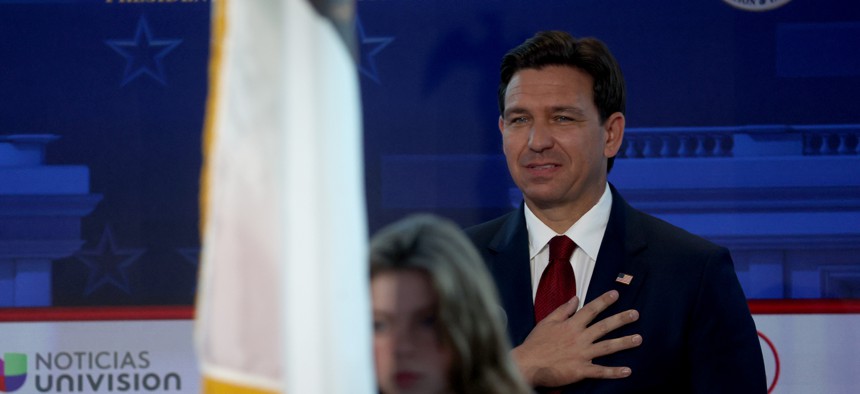Politics
Florida Gov. DeSantis leans into anti-communism to jolt presidential campaign
The move is consistent with legislation he backed in recent sessions.

Republican presidential candidate and Florida Gov. Ron DeSantis stands for the national anthem during the FOX Business Republican Primary Debate at the Ronald Reagan Presidential Library on September 27, 2023 in Simi Valley, California. Photo by Justin Sullivan/Getty Images
Less than a week after he revoked school vouchers at schools he alleged to have communist ties, Ron DeSantis said on the second Republican debate stage that China is America’s biggest adversary “by a country mile.”
But name-dropping the Chinese Communist Party isn’t a new development for Florida’s governor. DeSantis has staked his political future on taking a hardline stance against the CCP just as his party leaned into a similar message since the COVID-19 pandemic.
For instance, “in the week after former President Donald J. Trump tweeted about ‘the Chinese virus’ (on March 16, 2020), the number of coronavirus-related tweets with anti-Asian hashtags rose precipitously,” according to a study from the University of California San Francisco.
Since his name began entering the national spotlight in 2022, DeSantis has looked to increasingly frame his policies and rhetoric in opposition to communism at home and abroad. In Florida, this has also meant championing anti-communist legislation, ranging from directly affecting Chinese nationals to mandating anti-communist education in classrooms.
Last month, DeSantis had four private schools in Florida – Lower and Upper Sagemont Preparatory Schools in Weston, Parke House Academy in Winter Park, and Park Maitland School in Winter Park – banned from being able to take tuition vouchers, accusing them of having “direct ties to the CCP and their connections constitute an imminent threat to the health, safety, and welfare of these school’s students and the public.”
The governor said in a statement that “the Chinese Communist Party is not welcome in the state of Florida. We will not put up with any attempt to influence students with a communist ideology or allow Floridians’ tax dollars to go to schools that are connected to our foreign adversaries.”
Asked for evidence, the Department of Education “pointed to website language about Spring Education Group, the company that owns the schools. It states that it's owned by Primavera Holdings Limited, an investment firm mostly based in Hong Kong and owned by Chinese people living there,” Politico reported.
To Aubrey Jewett, a political science professor at the University of Central Florida, DeSantis leaning into anti-China rhetoric since becoming governor goes hand-in-hand with wanting to build foreign policy bona fides in the minds of Republican primary voters.
“Traditionally, governors have very little to do with foreign and defense policy. So by finding ways to take action against communism and against China, Gov. DeSantis is able to send a message to potential Republican primary and caucus voters that he's tough on America's enemy,” Jewett said.
Still, he is unconvinced that leaning into that narrative, like DeSantis did last week, will gain any more momentum in a race that is dominated more by Trump with each passing day. “I don't think it's hurting him. A lot of Republican voters probably agree with him, but it's not the magic he needs to catch up to Trump,” Jewett said.
Here’s a look at five bills DeSantis supported as governor that helped build up his anti-communism ‘cred’:
SB 264, SB 846 (2023) - Chinese National property ban
In one fell swoop earlier this year, the governor signed bills aimed at limiting Chinese citizens and others from owning land in Florida and limiting their role with state institutions.
The first bill bans the CCP and Chinese citizens from contracting with government entities or purchasing property in Florida that is close to military installations or for non-residential purposes. SB 846 also bans state colleges and universities from accepting gifts from a “foreign country of concern,” which includes China.
The former has drawn some of the sharpest rebukes from civil rights advocacy groups and the federal government. The ACLU and Chinese immigrants have sued the state over the law. In court filings, the U.S. Department of Justice said it believes the legislation violates the federal Fair Housing Act and the Constitution’s equal protection clause.
Currently, a judge denied a request for a court order to suspend enforcement of the law, but appeals on that issue are pending and in any case it would still need to go to trial.
HB 379, SB 258 (2023) - TikTok bans
DeSantis was an early adopter of the national anti-TikTok bandwagon, and in turn his state was one of the first to pass bans limiting the social media app, which is owned by a Chinese company.
Two Florida bills this past session banned TikTok and other Chinese-controlled technology from Florida schools and universities as well as government devices and servers. Concerns over the app, which boasts over 90 million American users, stem from its collection of user data.
During a bill-signing event, the governor raised questions over how Chinese concerns would use the data. “We think whatever utility that these applications have is clearly outweighed by the benefit that the CCP gets from data mining and being able to collect information,” he said.
While on the campaign trail, he added he would probably ban TikTok on the national level if he was elected president. “At the end of the day, I don’t want Big Brother to be getting into everybody’s apps. It’s about vulnerabilities to our country,” he said.
HB 395 (2022) - Victims of Communism Day
This law designated Nov. 7 as “Victims of Communism” Day in Florida. It requires a mandatory anti-communism lesson for high school students on that day every year for at least 45 minutes.
According to the bill’s text, the lessons are to include instruction about figures such as China’s Mao Zedong, the former Soviet Union’s Josef Stalin and Cuba’s Fidel Castro, and “how victims suffered under these regimes through poverty, starvation, migration, systemic lethal violence, and suppression of speech.”
The legislation received unanimous approval by the Florida Legislature. DeSantis signed the bill at Miami’s Freedom Tower, a symbol to Cuban Americans; it served as a help center for Cuban refugees fleeing the country from 1962 to 1974.
During his speech at the bill signing, DeSantis specifically referred to the tens of millions killed by Mao and the CCP. “That body count of Mao is something that everybody needs to understand because it is a direct result of this communist ideology,” he said.
HB 7 (2022) - Critical Race Theory ban
DeSantis grabbed national headlines for his attacks on critical race theory, a law school academic topic that conservative activists weaponized in battles over K-12 classrooms.
The governor signed a bill explicitly prohibiting the teaching of CRT in public schools, as well as teaching race-related topics in a way that makes students feel guilt or shame about their race because of historical events. In previous comments about CRT in conservative media, DeSantis explicitly looked to label the subject area as “Marxist.”
“Critical race theory is basically teaching people to hate our country, hate each other. It’s divisive and it’s basically an identity politics version of Marxism,” he said during a 2021 Fox News interview.
He’s not incorrect about its ties to Marxism. CRT, a legal theory based on the premise that race is a culturally invented category used to oppress and exploit people of color, is inspired by critical theory, a Marxist-inspired movement originally associated with the work of the Frankfurt School in the 1960’s and 1970’s.
HB 5 (2021) - Florida civics education revamp
Before he reached national prominence, DeSantis backed a Florida civics lessons revamp that included even more anti-communist lessons.
As part of a high school graduation requirement, students must take a government course that includes lessons on “a comparative discussion of political ideologies, such as communism and totalitarianism, that conflict with the principles of freedom and democracy essential to the founding principles of the United States.”
Additionally, the bill required the class to include first-person accounts from “victims of other nations' governing philosophies who can compare those philosophies with those of the United States.”
During the bill signing in 2021, DeSantis mentioned Cuba and other Communist countries, but didn’t mention China.
“Why would somebody flee across shark infested waters, say leaving from Cuba, to come to southern Florida? Why would somebody leave a place like Vietnam? Why would people leave these countries and risk their life to be able to come here? It’s important that students understand that,” he said.
Contact Tristan Wood at twood@cityandstatefl.com and follow him on X: @TristanDWood.
NEXT STORY: Miami city commission candidate fights in court to stay on November ballot
